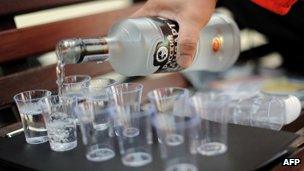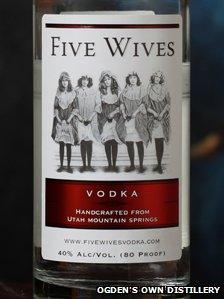Why are there so many brands of vodka on sale?
- Published

Russian Standard's label is printed in Cyrillic, to remind the drink that it is, you know, Russian
The latest new vodka brand has caused a row in the US state of Idaho. But why are so many different types of the colourless, flavourless spirit on sale in the US and UK?
"I judge a vodka by how I feel the next day. Our hangovers are minimal," says Steve Conlin, vice-president of marketing for Ogden's Own Distillery, makers of Five Wives Vodka.
"It's made from spring water from a mountain spring. It's a good clean vodka."
Five Wives sold well in Utah, where it is produced and bottled.
But when Conlin applied for a licence to sell it in neighbouring Idaho, it was rejected by the state liquor authority, which decides what gets stocked in the state's stores.
The authority's director, Jeff Anderson, did not like the cheeky name - a reference to polygamy practised by the 19th Century ancestors of America's Mormon population. Also, he said, there was simply no room on the shelves.
"We've got an over-proliferation of vodkas," Anderson told the Idaho Business Review last week.
Idaho sells 450 varieties of vodka, he said, including different sizes of a single brand, and Five Wives would have to compete with 106 other vodkas in its price range.
"We're telling people 'no' a lot of the time," he said. "Beyond the name, this product is trying to enter a competitive set that is crowded already. "
In recent years, drinkers in the US and the UK have been overwhelmed by a glut of new vodka brands.
Some of those are traditional Eastern European brands newly introduced on the export market, and others are "dreamed up overnight", says Jerald O'Kennard, director of the Beverage Testing Institute in Chicago.
"It's relatively easy to produce," he says. "You don't have to age it in a warehouse, in a barrel like a whiskey or a rum, and they're the most popular spirits. You've got a tsunami of economic and business reasons contributing to those numbers."
The spate of new entrants comes even though most drinkers cannot tell the difference between vodkas of similar quality, spirits experts say.
In the US, by law, classic vodka is near flavourless. US regulations require that vodka produced in the US be "neutral" and be sold "without distinctive character, aroma, taste or colour". Vodkas with added flavouring such as vanilla or rasberry are treated differently.
Spirits experts say that in fact, drunk neat and at room temperature, premium vodkas do offer a variety of subtle variations in flavour, sweetness, mouth feel and weight.
But the average punter who orders a vodka-tonic cannot taste the difference, and even in blind taste tests average drinkers cannot consistently distinguish between different bottles, according to analysis by market research firm Mintel.
"They're using it in mixed drinks," says Noah Rothbaum, editor-in-chief of Liquor.com and author of The Business of Spirits.

Five Wives's cheeky label is a nod to Utah Mormons' polygamous past
"Once you add it to, say, cranberry juice, or once it's shaken with a lot of ice, those differences are harder and harder to differentiate."
Many American vodkas contribute little to the actual manufacturing - they merely purchase 95% ethyl alcohol from industrial giants like Archer Daniels Midland or Midwest Grain Processors, add water, and filter the product to varying degrees.
With little noticeable distinction in taste, vodka makers rely on sophisticated marketing and branding campaigns to win customers, analysts say.
"Making it stand out on the back bar, on the liquor store shelf, making it look cool on the table in a club, these are not small considerations," Rothbaum says.
Most wine bottles conform to a handful of different shapes. But companies launching a new vodka brand will hire teams to design a distinct bottle to catch the eye, for instance. (Cheap Shot sells its "knockout quality" vodka in a box.)
Distilled Resources Inc, also in Idaho, ferments, distils and bottles high-end flavoured and unflavoured vodkas for dozens of brands who contract with the company.
"They came up with the name, they selected the bottle," says Gray Ottley, the distillery's director and vice-chairman, about one of the vodkas.
"That's their brand. They filed the trade mark."
In fact, three of the company's oldest brand partners - Blue Ice, Glacier and Zodiac - sell the same potato vodka, Ottley says.
Ogden's Own, based in Ogden, Utah, markets its vodka to drinkers who want something made locally.
The label, which features five young women in 19th Century dress coyly tugging at their petticoats, was an irreverent nod to Utah's Mormon history.
"Our label is quirky and interesting," says Conlin. "People like local."
It has sold well in the six months it has been on the market, approaching Absolut in the 750ml category, he says.
Since Jeff Anderson of the Idaho liquor authority suggested religious and moral considerations played a role in the decision to keep Five Wives off the shelf, Ogden's Own hired a prominent Washington constitutional lawyer.
On Wednesday, Idaho relented and agreed to allow retail customers, bars and restaurants in the state to place special orders of Five Wives. Anderson also invited Conlin to reapply to sell Five Wives on store shelves.
"The exposure's been very good," Conlin says.
"We're happy to have this resolved and hopefully we'll be selling product in Idaho fairly quickly."
- Published3 May 2012